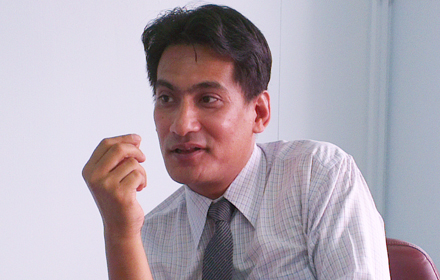Dr Saravuth: OIC never supports separatism
The ongoing peace talks between the government and the Barisan Revolusi Nasional separatist group is facing increasing resistance especially from the military in light of escalating violence perpetrated by bands of insurgents,

the Isra news desk recently sat down for an in-depth talk about the peace process, the BRN’s political ideology and its demands with Dr Saravuth Aree, a lecturer at the Muslim Study Centre of Chulalongkorn University.
The choice of the wording, “Siamese colonialist”, used by the BRN in reference to the Thai state.
Dr Saravuth explained that he thought Mr Hassan Taib, chief negotiator of the BRN, might have been influenced by the painful history of the Muslim world during the colonial period and chose the wording, "Siamese colonialist", to refer to the Thai state for its domination of what used to be parts of the Sultanate of Pattani and its ignorance of the inspirations of the Malay Muslims in the three southernmost provinces.
"If the wording was used 50 years ago, it would be treated as normal. But used in the 21st century context, it was strange," he said. But he pleaded for patience and understanding from the Thai public, saying that the BRN, in the past, had never had a chance to speak out in public about their political ideology and aspirations. "So when given a chance, they spoke out and it could not be accepted by the military," said Dr Saravuth.
He said that it should be accepted by all parties concerned that Pattani used to be a part of the Muslim world and the word, Pattani, was used for the past several years by the separatist groups but was never recognized by the Thai state.
Another wording used by the BRN – that is liberation organization and not separatist movement in reference to the rebel group.
In his perspective, Dr Saravuth said that liberation did not suggest separatism. Once peace talks started, he said the BRN should be treated as a legal entity so its demands would be legal, citing the case of the PLO, Palestinian Liberation Organisation which was recognized by the UN.
he centre of the southern unrest problem rests on one key issue – that is the future of Pattani. Dr Saravuth suggested that it was the duty of the Thai government to try to convince the BRN and Malaysia in its capacity as the facilitator to agree that the three southernmost provinces or Pattani as called by the separatists would remain with the Thai kingdom "but there must be major structural changes in economic, political and social aspects for Pattani but well within the framework of the Constitution."
The Mulim affairs expert noted that both the BRN and the Pattani United Liberation Organisation (Pulo) appeared to have admitted the hard fact that Pattani would never become an independent state. The farthest that the rebel groups could be expected to achieve is a special administration zone for Pattani, he said.
He believes that the BRN’s five demands which were first posted on the YouTube social media last month and again recently could be negotiated. He urged the government to stand firm on its stand on political solution to the unrest problem.
Dr Saravuth pointed out that there has never been a single case that the Muslims anywhere have succeeded in establishing an independent state on the territory they used to rule. He cited the case of Ajeh province in Indonesia, saying that after 30 years of war of liberation, Ajeh still remains with Indonesia although the war has ended.
In Kashmir, a war is going on between Indian forces and Kashmiri rebels seeking independence and Kashmir is still with India. Or in the southern Philippines, a ceasefire was brokered by Malaysia. But the Moro rebels’ dream for a separate homeland for Mindanao remains unrealized.
As for the OIC (Organisation of Islamic Conference), Dr Saravuth explained that the organization has more than 50 member countries and many of them have internal conflicts like the situation in southern Thailand. Given such background, he said the OIC would not support the idea of a separate or independent homeland for Pattani as that would backfire on the organization itself.
OIC, he added, has two charters that it has strictly observed. Firstly, the recognition of the territorial independece and sovereignty of member states and, secondly, special focus on human rights issue.
OIC used to intervene in 6-7 countries where Muslims are the minority but none of the cases ended with the creation of a separate or independent homeland for the Muslims, he continued.
As for the five demands of the BRN, Dr Saravuth said they were not too much and were negotiable and none of them would lead to a separate homeland. But talks alone will not solve the unrest problem, he said that both the government and the BRN should join hands to carry out activities, political or social, to bridge their mutual distrust and to build up trust which could gradually lead to the settlement of the conflict.
